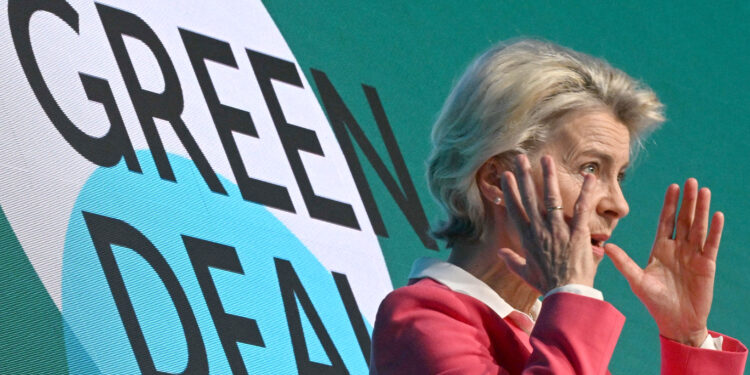Brussels – “The European Green Deal is a must for the health of our planet and our people – and for our economy” that will “help us cut emissions while creating jobs,” European Commission President Ursula von der Leyen said in 2019 in the Plenary session of the European Parliament in Strasbourg. From the stage set up at the European Parliament for election night, however, she did not even mention it. Others did, but not her. Perhaps because what was the mainstay of her first term has turned into a divisive issue for her electorate, and only by changing – or watering down – some policies has she been able to try to regain favor in the agricultural and industrial sectors. Yet, even though he emerges battered from the polls, the Green Deal does not seem to be on the table.
On the one hand, there are the positions of the far-right parties that have been successful in the polls. For example, Marine Le Pen‘s Rassemblement National in France, whose program envisages to “return to households the 5 billion in subsidies given in particular to wind farms,” to “block wind farm projects, and gradually dismantle existing ones,” to “revive the nuclear and hydroelectric sectors, and invest in hydrogen,” to “exit the European electricity market to restore decent prices.” Or like Austria’s FPO (the Freedom Party), which calls for “a halt to the unbridled destruction of the economy, industry, and competitiveness; fair payments to Austrian farmers, and protection of local agriculture; affordable energy for households and the economy; definitive end to the ‘Green deal’; lifting of the ban on combustion engines.” He simultaneously distances himself from nuclear power and favors renewables: “The EU is promoting the expansion of nuclear power under the pretext of ‘climate policy.’ The French are rubbing their hands and want to build 14 more nuclear power plants on top of the 56 existing ones. We are sitting on a barrel of nuclear dust.” For these reasons, the FPO urges to “stop promoting nuclear power as ‘clean energy,’ the expansion of renewable energy, a sensible environmental policy instead of an EU climate dictatorship.” Or like, again, the position of AfD, Alternative fur Deutschland, which, although expelled from the ID group, found a place there until about two weeks ago. “The dogma of man-made climate change serves as a pretext for the EU to intervene in all spheres of life. EU programs like the ‘Green deal’ and ‘Fit for 55’ are having a destructive impact on the European and, especially, the German economy,” AfD writes in its program. “Fossil fuels were and are the basis of our prosperity. The claim of a threat from man-made climate change is not based on scientific evidence. Rather, it is a political program aimed at taxing the air we breathe and enacting social transformations. It is an ecosocialist project that inevitably leads to a dramatic reduction in prosperity and a totalitarian restriction of freedom,” it continues.
On the other hand, however, there are the majority forces, liberals and socialists, and the Greens, who, in their speeches, address the Green Deal as at least inevitable as it is already in motion in the European industrial and manufacturing sectors. “For us, the deepening of the Green Deal and the strengthening of European democracy is crucial. And I hope that if the Council presents Ursula von der Leyen for a second term, this is at the heart of what it wants to achieve. We need to see the commitment to support her,” said outgoing Greens co-chair Philippe Lamberts. “The 2019 Green Deal was also a program for the economy. If we consider that the U.S. and China are pushing on the global race in green innovation, I think it would be a huge mistake on our part to abandon the Green Deal. Our businesses also want predictability and clarity for the future and, therefore, it is clear to us that any future program must include the Green Deal. Continuing the Green Deal in the context of an industrial strategy is imperative,” echoed candidate Bas Eichkout. “It’s up to us now to give citizens a strong message of hope, and this strong message is about a social Europe and a Europe that puts in place an environmental policy that prevents the catastrophes we see in Europe and around the world,” sounded the Socialist candidate, Nicolas Schmit. The President of the Renew Europe group, Valerie Hayer, stressed, “As president of Renew Europe, I have at heart the priorities of the liberal, centrist world: the Europe of defense, a Europe that is more competitive, the rule of law, the maintenance of ambitions on the Green Pact that has been the backbone of our mandate.”
So, the Green Deal comes out battered, but its path, now set in motion, will be difficult to deviate.
English version by the Translation Service of Withub










![Il commissario per l'Economia, Valdis Dombrovskis [Bruxelles, 18 febbraio 2025. Foto: European Council]](https://www.eunews.it/wp-content/uploads/2025/02/dombro250218-120x86.jpg)